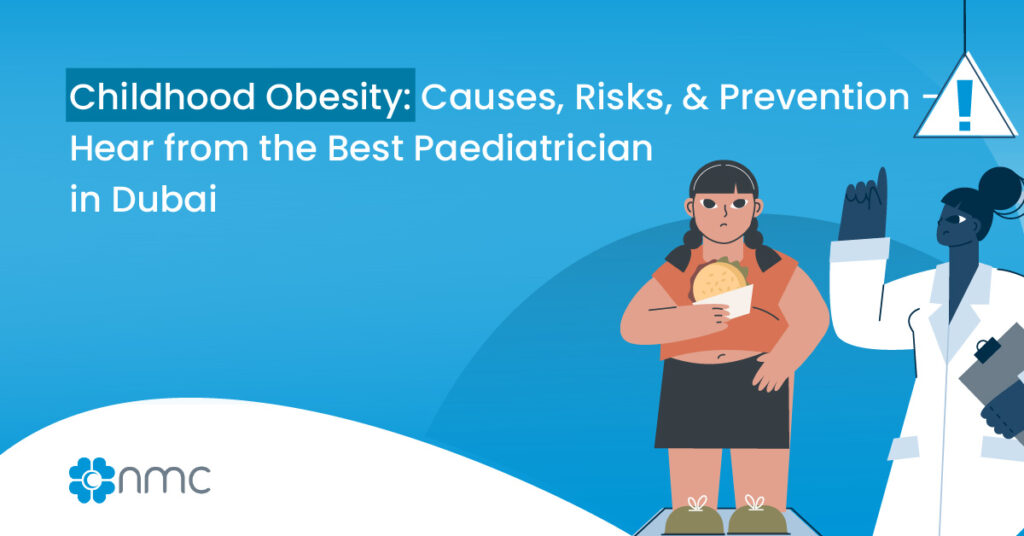Childhood obesity is a global health concern, and Dubai is no exception. The rapid growth and modernization of this vibrant city have brought about changes in lifestyle and dietary habits, leading to an increase in childhood obesity rates. To shed light on this issue, we’ve sought insights from the best paediatrician in Dubai to explore the causes, risks, and prevention strategies for childhood obesity.
Understanding the Childhood Obesity Epidemic in Dubai
Dubai’s remarkable transformation into a bustling metropolis has come with lifestyle changes that have had unintended consequences on children’s health. Factors such as increased urbanization, sedentary habits, and access to high-calorie foods have contributed to the rise of childhood obesity in the city.

The Causes of Childhood Obesity
To effectively combat childhood obesity, it’s crucial to understand its root causes. Dr. Ahmed elaborates on the primary contributors:
1. Dietary Habits:
Fast Food and Processed Snacks: A diet high in fast food and processed snacks, laden with sugars and unhealthy fats, can lead to excessive calorie intake. It’s essential for parents to educate their children about making healthier food choices and to provide balanced meals at home.
2. Lack of Physical Activity:
Sedentary Lifestyle: Excessive screen time, including television and video games, has reduced physical activity among children. Encourage outdoor play, sports, and other physical activities to keep children active. Parents should set an example by being active themselves.
3. Genetic Factors:
Family History: Genetic factors can make some children more susceptible to obesity. A family history of obesity doesn’t mean a child is destined to be overweight. It means we need to be more vigilant and proactive in promoting a healthy lifestyle.
4. Psychological Factors:
Emotional Eating: Stress, anxiety, and emotional factors can lead to overeating as a coping mechanism. Parents should be aware of their child’s emotional well-being and provide emotional support. If emotional eating is a concern, seek professional help.
Health Risks Associated with Childhood Obesity
Childhood obesity isn’t just a matter of appearance; it poses significant health risks:
1. Type 2 Diabetes:
Obesity increases the risk of developing type 2 diabetes in children. Regular check-ups with a paediatrician are crucial to monitor blood glucose levels and detecting any signs of diabetes early.
2. Heart Disease:
Obesity in childhood can lead to the early development of heart disease. It’s essential to assess cardiovascular health through regular check-ups and adopt a heart-healthy lifestyle.
3. Joint Problems:
Excess weight can strain joints, leading to musculoskeletal issues. Paediatricians can offer guidance on managing joint problems through physical therapy and weight management.
4. Mental Health Challenges:
Obesity can be associated with mental health issues, including depression and anxiety. Addressing mental health challenges is as important as physical health. Paediatricians can collaborate with mental health professionals to provide comprehensive care.
5. Low Self-Esteem and Social Isolation:
Children with obesity may experience low self-esteem and social isolation. Parents should provide support, resources, and referrals if needed, to boost their child’s self-esteem and address social challenges.
Prevention and Management of Childhood Obesity
Preventing and managing childhood obesity requires a holistic approach involving parents, healthcare professionals, and the community:
1. Healthy Eating:
Encourage a balanced diet with plenty of fruits, vegetables, lean proteins, and whole grains. Limit sugary drinks and processed foods. Collaborate with a paediatrician to create a customized meal plan for your child. It’s crucial to make healthy eating enjoyable and sustainable.
2. Physical Activity:
Promote regular physical activity through enjoyable and age-appropriate activities. Work with your paediatrician to identify suitable exercise routines for your child. Make physical activity a family affair.
3. Behavioural Changes:
Address emotional and stress-related eating through counselling and support. Paediatricians can recommend behavioural therapy or support groups to help children develop healthier coping mechanisms.
4. Family Involvement:
Involve the entire family in adopting a healthy lifestyle. Parents can set the stage for a healthy family lifestyle through their own behaviours.
5. Regular Check-Ups:
Schedule regular check-ups with a paediatrician to monitor your child’s progress and make necessary adjustments to the treatment plan. Regular visits to a paediatrician are essential for tracking a child’s growth and development. It’s an opportunity to address any concerns and receive guidance on a healthy lifestyle.
Conclusion
Childhood obesity is a significant health concern that requires proactive measures. Finding the best paediatrician in Dubai is an essential step in preventing and managing childhood obesity. A skilled and compassionate paediatrician can provide guidance, support, and personalized care to help your child achieve and maintain a healthy weight. By addressing childhood obesity early and comprehensively, you can give your child a brighter and healthier future. Remember, it’s never too late to make positive changes for your child’s well-being.